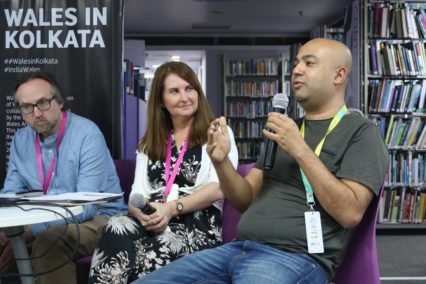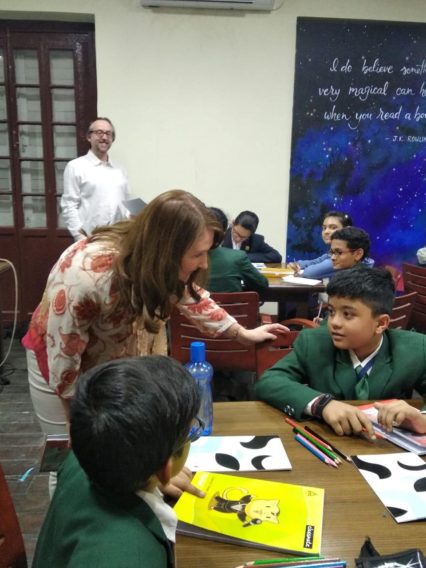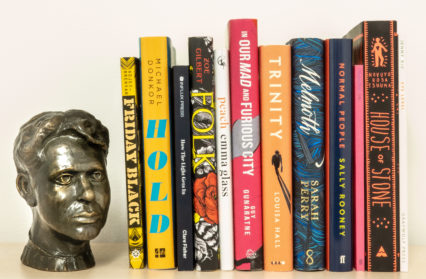The Swansea University International Dylan Thomas Prize boasts the largest purse for young writers in the world, at £30,000 for the winner. As the prize seeks to expand its global reach, Gary Raymond talks to director of the awards, Dr Elaine Canning, during the #WalesinKolkata season of works in India curated by British Council Wales and Wales Arts International.
Why is the International Dylan Thomas Prize reaching out to India as part of the Wales in Kolkata programme?
One of the primary objectives of the Dylan Thomas Prize, and its educational strand, DylanED, has been to engage with international audiences and young writers. The literary Prize competition attracts entries from around the world each year, and the Wales in Kolkata programme has provided us with a unique opportunity to celebrate the international focus of the Prize in India, and to encourage Indian writers and publishers to submit their work to us. The Wales in Kolkata programme has also facilitated the first instance of ‘DylanED going global’, a very special development to our DylanED programme which to date has focused on introducing young people in South Wales to literary texts, including the words of Dylan Thomas, and encouraging them to develop their individual creative voices.
 The Prize has a unique focus on outreach – things that are not just about the accolade. This is about a new way of looking at the business of literature, isn’t it? Could you talk a bit more about that aspect of the award?
The Prize has a unique focus on outreach – things that are not just about the accolade. This is about a new way of looking at the business of literature, isn’t it? Could you talk a bit more about that aspect of the award?
We are passionate about giving young people an opportunity to meet with international writers, and to engage in creative self-expression through a variety of forms and styles – book reviews, writing competitions (short stories and poetry), and art. The Prize encapsulates a range of wonderful assets which we can use for these purposes, with shortlisted writers visiting Swansea in May each year, judges and former winners running workshops, and of course Dylan Thomas’s works which underpin the cross art workshops we run for primary school children.
And what is the focus of the new module attached to the prize now underway at Swansea University?
The Prize module is open to final year undergraduates of English Literature and is running for the first time in 2019. We are very excited about this new development to our curriculum! Each year, our students will get the chance to explore the new longlist of twelve books, consider different aspects of the shortlisting process for a literary prize, and have access to industry professionals such as literary agents, marketeers, authors and judges. All of them will also be able to sign up as ‘Dylan Thomas Prize Interns’, meaning that they get to meet and interview the shortlisted authors, write reviews and blogs, and assist with event management and delivery at DylanED showcases and competition announcements, as well as the Dylan Thomas Prize award ceremony.
Tell us a little about some of the things you’ve done while you’ve been here.
I’ve run a number of DylanED workshops for 8-12 year-olds that have been inspired by Dylan Thomas’s ‘Holiday Memory’. Through a number of techniques, including storytelling and responses to several of Dylan’s ‘action words’, children have been inspired to craft their own short stories about special adventures with friends to familiar and imaginary places.
How well does Thomas’ work travelled in India?
This has been the first time we’ve taken DylanED to India and it has been fantastic to see the children draw some inspiration from Dylan Thomas in such a short space of time. We started with some beautiful, detailed artworks of a young Dylan kindly shared with us by Swansea artist Jeff Phillips featuring the docks, Cwmdonkin Park and Swansea Grammar School. The children responded with detailed descriptions of the settings of their stories, as well as ‘Holiday Memory’-inspired lists of people and activities. Some even incorporated a few of the action words we’d performed at the beginning of the workshops.
As well as DylanED sessions, I delivered a public talk on the literary prize at the British Council Library in Kolkata, then chaired an ‘in conversation’ event with former judge and shortlisted author, Prajwal Parajuly. I later travelled to Jaipur to the Zee Jaipur literary festival where the 2018 winner of the Prize, Kayo Chingonyi, appeared in two fascinating panel discussions on poetry and Reni Eddo-Lodge’s bestseller Why I’m No Longer Talking to White People About Race. Former judges of the Prize – Namita Gokhale, a founder and co-director of the festival, Tishani Doshi, and Belfast writer Paul McVeigh – also participated in a number of wonderful sessions ranging from book launches to themed panels and discussions of the short story genre. One particularly poignant moment was witnessing Paul McVeigh present an award to a writer published for the first time after his participation in a Jaipur Bookmark event with agents, authors & publishers.
Did you find any specific challenges in bringing the idea of the Dylan Thomas Prize (DTP) to India?
The Dylan Thomas Prize – both the literary award and DylanED – have been very warmly received in India. I suppose the key challenges for me in terms of preparation were how well-known Dylan Thomas was amongst India’s writing and publishing community, and how children would respond to some of the more difficult and playful language in his stories.
What were your impressions of Jaipur?
Crossing the entrance of the Zee Jaipur literary festival is like stepping into a beautiful explosion of words, music and colour. It is a magical site of discussion and debate.
 What are your aims, domestically and internationally, in the next ten years for DTP?
What are your aims, domestically and internationally, in the next ten years for DTP?
You’re right, it is a busy and noisy business, and we need to continue celebrating the constituent parts of our prize. We can do so by increasing the presence of our writers and judges at literary festivals around the world, and by encouraging them and our students to be our ambassadors. We are also just beginning to develop our global programme for DylanED, and there are so many new audiences we hope to reach. Of course, we also want to continue to increase our engagement with new publishers and writers. 2020 will be a very special year for the Prize as we celebrate fifteen years since its inception, as well as Swansea University’s centenary. I can’t reveal too much just yet, but let’s just say that we have several very exciting initiatives underway, including a Dylan Thomas Prize themed literary festival.
This is part of a long journey for the DTP, does it feel like that?
Yes it does. The Prize was established in 2006 and Swansea University’s formal association with it stems from the end of 2013. Each year we see the literary prize grow in terms of the diversity and scale of publisher and author engagement across the world. With DylanED, we have run a variety of workshops for 8-18 year-olds and the general public in South Wales, but we have a long way to go in terms of developing the international reach of this educational project. The Wales in Kolkata programme has enabled us to make a significant first step towards our core objective in this area.
What has been the response and feedback in India to the talk about the DTP?
It has been incredibly positive, from direct contact with writers immediately after the talk, to email correspondence with authors and publishers in the days that followed. The fact that the Prize welcomes submissions across all literary genres has had a certain appeal amongst young writers.
It’s interesting – and unusual – to have a literature prize that accepts submissions of all forms; has this been a challenge or a boon for it so far? (Maybe here’s a chance to talk about some specific entries in the past that have subverted the norm in terms of book prizes.)
It’s definitely one of the most positive and extraordinary aspects of the Prize, inspired by Dylan’s open playfulness with form and language, and can potentially contribute to discussions on traditional approaches to genre. Max Porter’s internationally-acclaimed Grief is the Thing with Feathers, for example, the recipient of the 2016 award, is a wonderful example of the fluidity of genre. It has been described as part novella, part fable, part essay, a work that slips gently between poetry and prose; a hybrid form. It has been translated into multiple languages and its sold out stage version, directed by Enda Walsh and starring Cillian Murphy, opens at the Barbican next month. I am looking forward very much to seeing this Prize-winning work come to life on stage.
To find out more about the Dylan Thomas Prize, and 2019 longlist of nominees, click here.






 Enjoyed this article? Support our writers directly by buying them a coffee and clicking this link.
Enjoyed this article? Support our writers directly by buying them a coffee and clicking this link.








